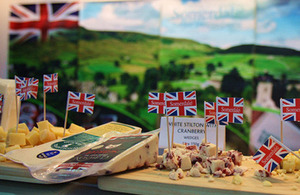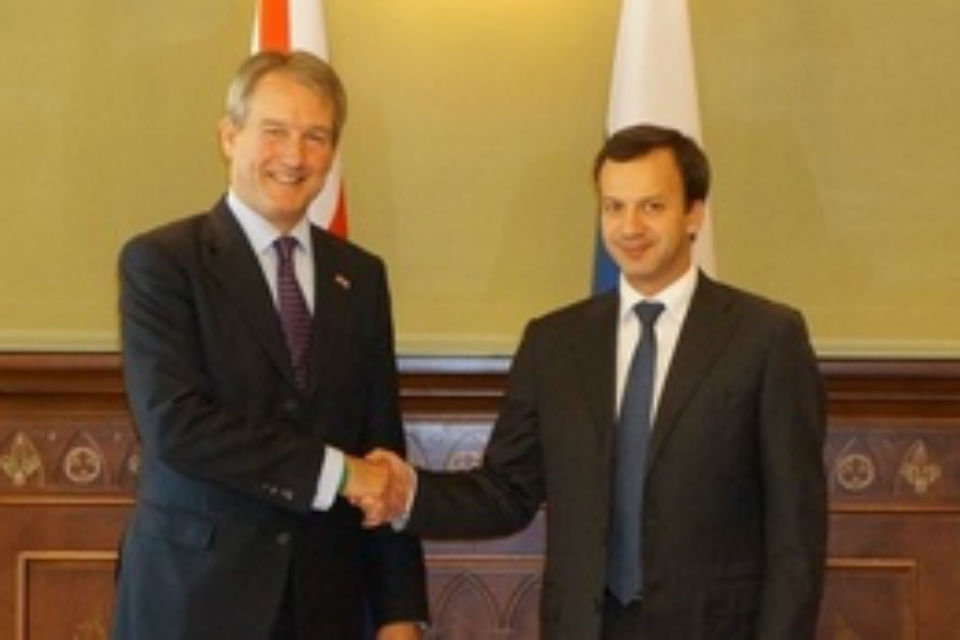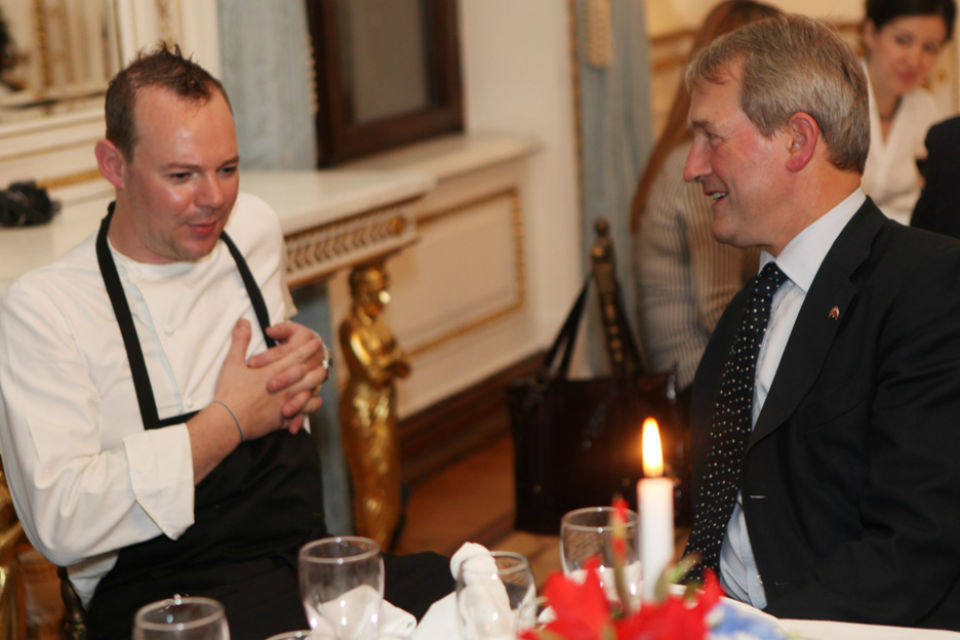Owen Paterson heads to Russia to help boost British exports
Owen Paterson is leading a UK delegation of food and drink companies to Russia to fly the flag for Great British food.

British Cheese
Environment Secretary Owen Paterson is leading a UK delegation of food and drink companies to Russia this week to fly the flag for Great British food and open up more trade.
We’ve increased food and drink exports to Russia by just over 220% since 2000, to over £121 million. But there is still huge potential for us to do more.
Multi-million beef and lamb trade deal opened with Russia
Starting from Monday 16 September 2013, this page will updated with daily updates from his trade mission.
Day Three
The final day of my trade mission to Russia took me to the famous ‘White House’ building near Red Square where I met the Deputy Prime Minister Arkady Dvorkovivh and finalised an historic agreement to allow the trade in UK beef and lamb to resume for the first time since the mid 1990’s.
The deal includes a £7m contract for lamb meat and opens the door to a further £2m contract for beef offal. Overall we expect it to be worth up to £100m over the next three years. I cannot emphasise enough how important this deal is to the future prosperity of our food industry and the economy as a whole. It’s a real credit to our producers and vets who have all worked so hard to make this happen.

Owen Paterson and Russian Deputy Prime Minister Arkady Dvorkovivh finalise trade deal on British beef and lamb
Russia opening it gates to UK beef and lamb sends out a clear message to the rest of the world that if you buy British, you’re buying quality.
Next we headed just outside Moscow to visit the Russian Institute for Plant Health whose work includes the detection of plant pests, pathogens and their control.
I was immediately struck by their state of the art facilities. The Centre monitors 85 plant diseases including Fire Blight, Potato Brown Rot and Plum Pox Virus.
I want to see plant diseases treated with the same seriousness as those affecting animals. We need to ensure that we have the right control measures and early warning systems in place to stop them having devastating impacts on our crops, forests and woodlands.
That’s why I’ve agreed with the Russian authorities to have regular meetings between our respective specialists in both plant and animal health and annual meetings at institutional level. It can only be of mutual benefit if together we share our scientific knowledge and expertise in these areas.
It’s been a hectic but immensely rewarding three days in Russia. I’ve learnt so much about this fantastic country and the way it does business.
We’ve showcased British food and drink, opened up more trade and established key partnerships, not least in the global battle against animal and plant diseases.
I’ve been extremely impressed by the hospitality and professionalism of the Russian people. I know our two countries partnership can only go from strength to strength.
Day Two
This morning I met Nick Brookes, General Director from Genus, a leading UK company supplying bovine and porcine genetic material to Russia. It was absolutely fascinating to hear about the biotechnology they use to advance animal breeding. Through their own innovation, they have become world leaders in improving porcine and bovine stock. They have farmers and food producers from 70 countries queuing up for their skills including from China, India and Brazil.
This is exactly the sort of innovative entrepreneurship I want to see coming out of the UK. We have some of the best scientists and researchers and agri-technology in the world and we should be shouting about it.
We then headed over to meet the Russian Minister of Natural Resources and Environment where we had a very positive discussion on the issues of illegal wildlife trade (IWT) and the devastating effects that it is having on some of the planet’s most iconic species. I was pleased to hear about Russian efforts to tackle IWT, particularly around their global tiger initiative which was kicked off in 2010 by President Putin.
IWT is more than just an environmental issue. It is often linked to organised crime and can fuel terrorism, leading to regional insecurity. I think Russian experience, especially around the illegal trade in tigers, will prove invaluable in the efforts to combat these horrendous crimes. I am extremely hopeful that Russia will take a key role alongside other international partners at the UK conference on IWT we are planning for early next year.
It was then off to visit the Russian Institute of Experimental Veterinary Science for a tour of their laboratories. Animal disease can have disastrous impacts and are a concern for every country around the globe. Russia is no different; they currently monitor several different types of animal disease, including African Swine Fever and Schmallenberg.
We followed this visit with a trip to the river where we boarded the Maxim Gorky for a reception with the European and Mediterranean Plant Protection Organisation Council (EPPO), who have members from 50 countries including the UK. The Council promotes plant health and, like me, their first priority is safeguarding against plant disease. The reception coincided with the election of Martin Ward, our Chief Plant Officer, as EPPO’s new Director General. It was a real pleasure to be one of the first to congratulate him on his prestigious new role.
I am keen we build our existing partnerships and develop closer collaborations between our veterinary agencies in the areas of research and development. It is only by sharing knowledge and experiences in areas like disease detection and testing that we can get better at addressing some of the global diseases we face, safeguarding animal and plant health, freeing up trade.
That’s why I am thrilled we have signed an agreement between the key animal health laboratories in the UK and Russia to advance scientific co-operation between both countries.
We ended the day with a dinner hosted by the British Ambassador at his Residence just opposite the walls of the Kremlin. The dinner was held to celebrate the reopening of the beef and lamb market to British producers for the first time in more than a decade. The fine British food was washed down with Scotch Whisky, another growth product in Russia and one we are working hard to safeguard against fakes. Guests included Russian buyers, restaurant and hotel chain owners, all eager to tap into the new premium food and drink market – something we, the UK, can supply.

Owen Paterson meets chef, Daniel Phippard
Tomorrow morning I am meeting the Russian Deputy Prime Minister to finalise the historic agreement, which will enable British farmers to benefit from a growing market and discerning Russian consumers to enjoy Great British produce.
- Photos from the trade mission are available on our Flickr site
- Follow Defra’s latest food activities by following the Defra Food Twitter account.
Day One
I touched down in Moscow yesterday evening with my team. We have a packed agenda over the next few days promoting British business and I’m keen to get started.
After a briefing with HM Ambassador I started the first day of my trade mission to Russia chairing a meeting with UK companies working in the Russian environmental sector.
I was interested to hear how UK expertise in sustainability and natural resources is being embraced in Russia. It was also good to learn more about the barriers and opportunities companies such as Unilever and Arup face when carrying out business in the country.
One of the key challenges was with regulation. Russia has a complex regulation framework, with over 100 environmental regulations under review. Navigating this complex system is proving difficult for some so I’m keen that we work with the Russian authorities and the Embassy to make the whole process work better for the environment and business. We also discussed opportunities including the transfer of UK knowledge and skills on major projects such as London 2012. This is a big opportunity for UK business, especially as Russia are due to host the Sochi Winter Olympics in 2014.
Next we headed to ‘World Food Moscow’, the largest international food and drink exhibition in Russia with over 1000 exhibitors from 64 countries around the world.

Owen Paterson promoting British food at World Food Moscow
After opening the show I was keen to meet all the UK companies competing for a slice of the lucrative Russian market for quality food and drink. I toured all the UK stands, the largest delegation to visit Russia in recent years, and was blown away by the fantastic range of ‘Great’ British food on offer from confectionery to tea, cheese to smoked salmon. I was particular impressed by the attitude of the businesses I met. They were aware of the market potential, passionate about their products and grasping the opportunity to trade with both hands. I spoke to one company currently exporting to 32 countries over five continents who pointed out that getting the branding right for their target market was essential and instrumental to success. This seemed to be a common thread with other companies including one who had grown from £350,000 turnover in 2008 to cracking the million pound barrier last July.
Indeed UK food and drink exports to Russia have increased by just over 220 per cent since 2000. They are now worth more than £121 million. This is fantastic but with Russia’s growing economy there is still huge potential to do more.

Owen Paterson with British food trade delegation to Russia
I closed the day by speaking at a UK delegation and buyers event hosted by the Food and Drink Exporters Association and UKTI. It was interesting to hear that import and Custom regulations still are causing some companies headaches. This is an area in which I am adamant that government can help and will be talking to the Russian authorities so we can work together to address this. It’s been a successful first day here in Russia and I’m looking forward to championing British beef and lamb products tomorrow.
Background to the trade mission
Environment Secretary Owen Paterson said:
The businesses joining me in Moscow are trading on the back of Britain’s global reputation for quality. With demand for Western food and drink increasing across the world, there’s no better time to venture into new export markets.
Aspiring entrepreneurs should have every opportunity to realise their ambitions overseas. Demand for UK food and drink in Russia is growing, I will do all I can to ensure we capitalise on this opportunity.
In advance of the trip the Secretary of State addressed the UK delegates attending World Food Moscow
I very much want to work with you in Russia, if there is any problem with paper work or documentation I’m absolutely clear that we, at Defra, are here to help. Only by working together are we able to increase exports as we need to.”
Click here to see the full video.
Joining the Secretary of State will be British businesses looking to break into the Russian market including Hawkshead Relish Company and Clipper Tea who are keen to share their experiences and inspire others.
Maria Whitehead, Co-owner/director of Hawkshead Relish Company said:
We have always hoped that by example we can enthuse other companies to follow suit and be confident that exports can be considered a valuable route for British companies both large and small.
Patrick Cairns, CEO of Kallo Foods Limited said:
The great thing about export is that the potential is virtually limitless. Over time our adventurousness has been rewarded, with overseas markets becoming a vital, dynamic element of our growth and profitability.
For case studies and advice from British Business looking to export to Russia and other markets go to our article on Open to Export.
Updates to this page
-
Updated with diary Day Three
-
Added day two
-
Updated with Day One of the trade mission
-
First published.